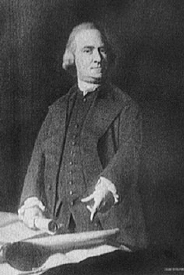| United States
History
The radicals' most effective leader was Samuel Adams of Massachusetts, who toiled tirelessly for a single end: independence. From the time he graduated from Harvard College in 1740, Adams was a public servant in some capacity -- inspector of chimneys, tax-collector and moderator of town meetings. A consistent failure in business, he was shrewd and able in politics, with the New England town meeting his theater of action. Adams's goals were to free people from their awe of social and political superiors, make them aware of their own power and importance and thus arouse them to action. Toward these objectives, he published articles in newspapers and made speeches in town meetings, instigating resolutions that appealed to the colonists' democratic impulses. In 1772 he induced the Boston town meeting to select a "Committee of Correspondence" to state the rights and grievances of the colonists. The committee opposed a British decision to pay the salaries of judges from customs revenues; it feared that the judges would no longer be dependent on the legislature for their incomes and thus no longer accountable to it -- thereby leading to the emergence of "a despotic form of government." The committee communicated with other towns on this matter and requested them to draft replies. Committees were set up in virtually all the colonies, and out of them grew a base of effective revolutionary organizations. Still, Adams did not have enough fuel to set a fire. 
Custom Search
Source: U.S. Department of State |
 During a three-year interval of calm, a relatively small number of
radicals strove energetically to keep the controversy alive, however.
They contended that payment of the tax constituted an acceptance of the
principle that Parliament had the right to rule over the colonies. They
feared that at any time in the future, the principle of parliamentary
rule might be applied with devastating effect on all colonial liberties.
During a three-year interval of calm, a relatively small number of
radicals strove energetically to keep the controversy alive, however.
They contended that payment of the tax constituted an acceptance of the
principle that Parliament had the right to rule over the colonies. They
feared that at any time in the future, the principle of parliamentary
rule might be applied with devastating effect on all colonial liberties.